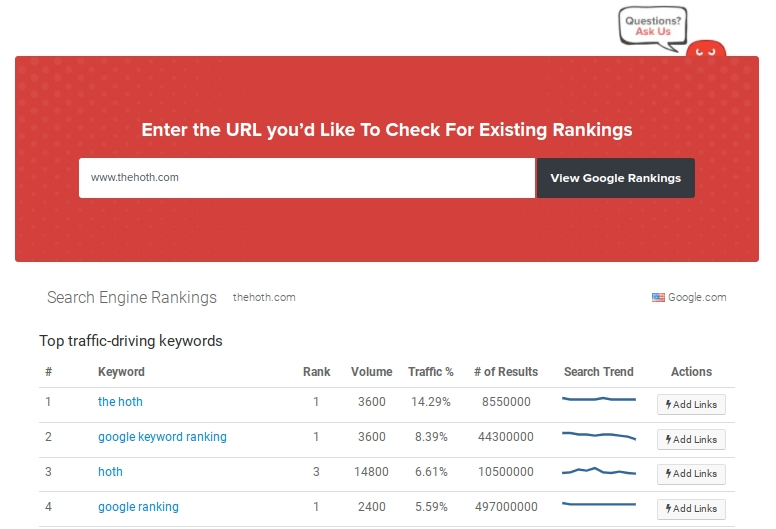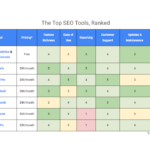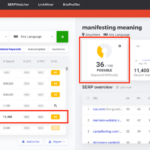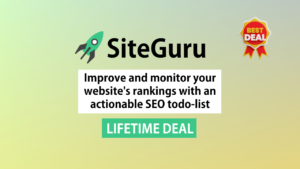SEO ranking tools are essential for digital marketers. They help analyze and improve website performance.
In the competitive world of online marketing, standing out is crucial. SEO ranking tools offer insights into your website’s performance, showing where you can improve. They track keyword rankings, analyze backlinks, and provide competitor analysis. This helps you make informed decisions to boost your website’s visibility.
With the right tools, you can stay ahead of the competition and attract more visitors. Investing time in learning these tools can significantly impact your online success. In this post, we’ll explore various SEO ranking tools that can help you achieve your goals. Let’s dive in and discover the benefits these tools offer.
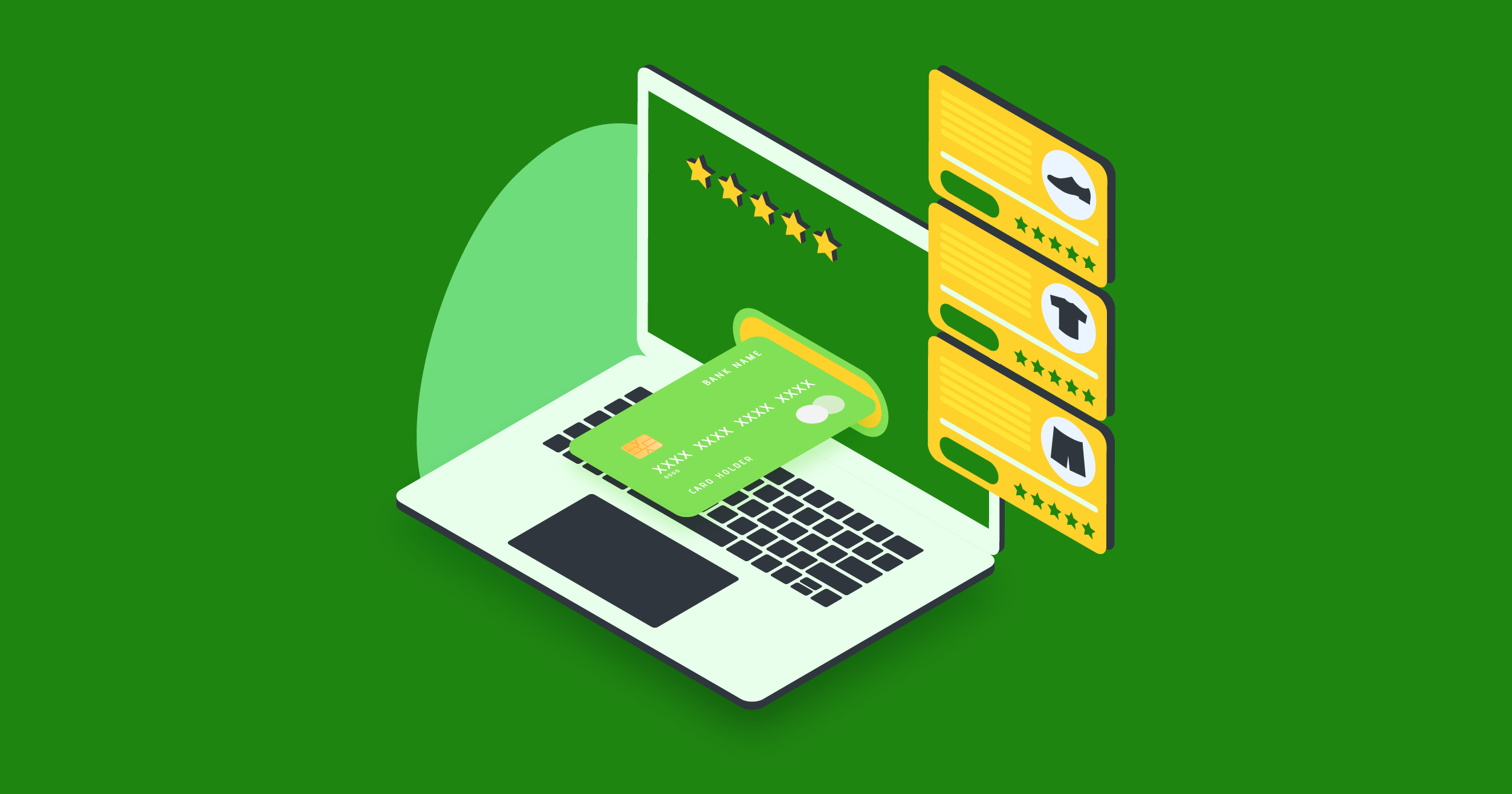
Credit: prerender.io
Table of Contents
ToggleIntroduction To Seo Ranking Tools
Understanding and utilizing SEO ranking tools is essential for any website’s success. These tools help you analyze and improve your site’s visibility on search engines. With the right SEO tools, you can identify weak points and optimize your website for better performance.
What Are Seo Ranking Tools?
SEO ranking tools are software applications designed to help you improve your site’s search engine rankings. They provide insights into various aspects of your website, such as:
- Keyword rankings
- Backlinks
- Site performance
- Competitor analysis
These tools offer detailed reports and actionable recommendations. This enables you to make informed decisions and enhance your site’s SEO strategy.
Importance Of Seo For Websites
SEO, or Search Engine Optimization, is crucial for websites. It helps in:
- Increasing organic traffic
- Improving user experience
- Boosting credibility and trust
- Achieving higher conversion rates
Without good SEO, a website may struggle to attract visitors. This can lead to lower visibility and fewer opportunities for growth.
Using SEO ranking tools ensures you stay ahead of the competition. They help you monitor and enhance your website’s performance continually. This makes SEO an ongoing process, not a one-time task.
Keyword Research Tools
Keyword research tools are essential for improving your website’s SEO. They help you find the best keywords to target. This increases your site’s visibility and drives more traffic. Additionally, using keyword research tools can help you uncover new keywords that you may not have considered before. These tools provide valuable insights into search trends and user behaviors, allowing you to optimize your content accordingly. By regularly utilizing keyword research tools, you can stay ahead of the competition and ensure that your website is effectively reaching your target audience.
Finding The Right Keywords
Finding the right keywords is the first step in keyword research. Start by brainstorming a list of topics related to your business. Think about what your customers might search for.
- Use tools like Google Keyword Planner and Ubersuggest.
- Look for keywords with high search volume but low competition.
- Consider long-tail keywords for more specific searches.
Long-tail keywords often have less competition. They can attract highly targeted traffic. This can lead to higher conversion rates.
Analyzing Keyword Competitiveness
Once you have a list of potential keywords, analyze their competitiveness. This helps you understand how hard it will be to rank for each keyword.
Use tools like Ahrefs and SEMrush to check:
- Keyword difficulty scores
- Number of backlinks needed
- Top-ranking pages for each keyword
These tools provide valuable insights. They show you which keywords are worth targeting. Focus on keywords with moderate difficulty and high potential traffic.
Here’s a quick comparison of popular tools:
| Tool | Features | Price |
|---|---|---|
| Google Keyword Planner | Search volume, competition, CPC | Free |
| Ubersuggest | Keyword ideas, traffic, SEO difficulty | Free & Paid |
| Ahrefs | Keyword analysis, backlinks, SERP analysis | Paid |
| SEMrush | Keyword research, competitive analysis, site audit | Paid |
Choose the tool that fits your needs and budget. Consistent keyword research can improve your SEO strategy. This drives more traffic to your website.
On-page Seo Tools
On-Page SEO Tools are essential for improving your website’s visibility. These tools help you optimize individual web pages. This makes your content more search engine friendly. They focus on elements like content, meta tags, and HTML structure. Let’s explore some key aspects of On-Page SEO Tools.
Optimizing Content
Optimizing content is crucial for SEO. It involves using relevant keywords. You should place these keywords naturally in your text. Tools like Yoast SEO and SEMrush can help. They provide suggestions for keyword placement. They also check the readability of your content.
- Keyword Density: Ensure keywords are not overused.
- Content Length: Longer content often ranks better.
- Headings: Use headings to structure your content.
These tools also analyze your content for SEO best practices. They suggest improvements to make your content more engaging. For instance, they might recommend adding images or videos. This enhances the user experience on your page.
Improving Meta Tags
Meta tags play a significant role in SEO. They include title tags and meta descriptions. These elements tell search engines about your page. They also influence how your page appears in search results.
| Meta Tag | Purpose |
|---|---|
| Title Tag | Displays the page title in search results. |
| Meta Description | Provides a brief summary of the page content. |
Tools like Moz and Ahrefs help improve meta tags. They offer suggestions for creating effective title tags. They also help write compelling meta descriptions. These tools ensure your meta tags are the right length. They also make sure they include important keywords.
- Create unique title tags for each page.
- Keep title tags under 60 characters.
- Write meta descriptions that are 150-160 characters long.
Improving your meta tags can boost click-through rates. This drives more traffic to your site. Using the right tools makes this process easier. It ensures your meta tags are optimized for search engines.
Backlink Analysis Tools
Backlink analysis tools are vital for understanding and improving your site’s SEO performance. These tools help you analyze your backlinks, which are links from other websites that point to your site. Quality backlinks can boost your search engine rankings. Using these tools, you can identify high-quality backlinks, track their performance, and take necessary actions to maintain or improve your backlink profile.
Identifying Quality Backlinks
Not all backlinks are created equal. Quality backlinks come from reputable and relevant websites. These links signal to search engines that your content is valuable. To identify quality backlinks, use tools that provide metrics like Domain Authority (DA), Page Authority (PA), and Trust Flow. These metrics help you understand the potential impact of a backlink.
Here are some popular tools for identifying quality backlinks:
- Ahrefs: Offers detailed backlink analysis with metrics like URL Rating (UR) and Domain Rating (DR).
- SEMrush: Provides insights into backlink quality with its Authority Score and other metrics.
- Moz Link Explorer: Helps identify high-quality backlinks with its DA and PA metrics.
Tracking Backlink Performance
Once you’ve identified quality backlinks, it’s crucial to track their performance. Monitoring how these backlinks affect your site’s SEO can help you make informed decisions. Backlink performance tracking tools offer insights into the number of backlinks, their sources, and their impact on your rankings.
Consider these tools for tracking backlink performance:
- Google Search Console: Provides data on backlinks and their impact on search performance.
- Majestic: Offers detailed insights into backlink history and metrics like Citation Flow and Trust Flow.
- Monitor Backlinks: Tracks new and lost backlinks and their influence on your SEO.
Using these tools, you can ensure your backlinks continue to benefit your site’s SEO. Regular monitoring helps you maintain a healthy backlink profile, which is essential for long-term search engine success.
Website Audit Tools
Website audit tools are essential for improving your site’s SEO performance. They help identify issues that might affect your site’s ranking and provide actionable insights.
Diagnosing Site Issues
Website audit tools scan your site to find technical issues. These issues can impact your site’s visibility in search engines. Common issues include:
- Broken links
- Duplicate content
- Missing meta tags
By addressing these issues, you ensure a smoother user experience. This helps improve your site’s ranking.
Enhancing Site Speed
Site speed is a crucial ranking factor. Slow-loading sites can lead to higher bounce rates. Website audit tools analyze your site’s speed and provide recommendations for improvement.
Common suggestions include:
- Optimizing images
- Minifying CSS and JavaScript files
- Leveraging browser caching
Improving site speed enhances user experience. This can lead to better search engine rankings.
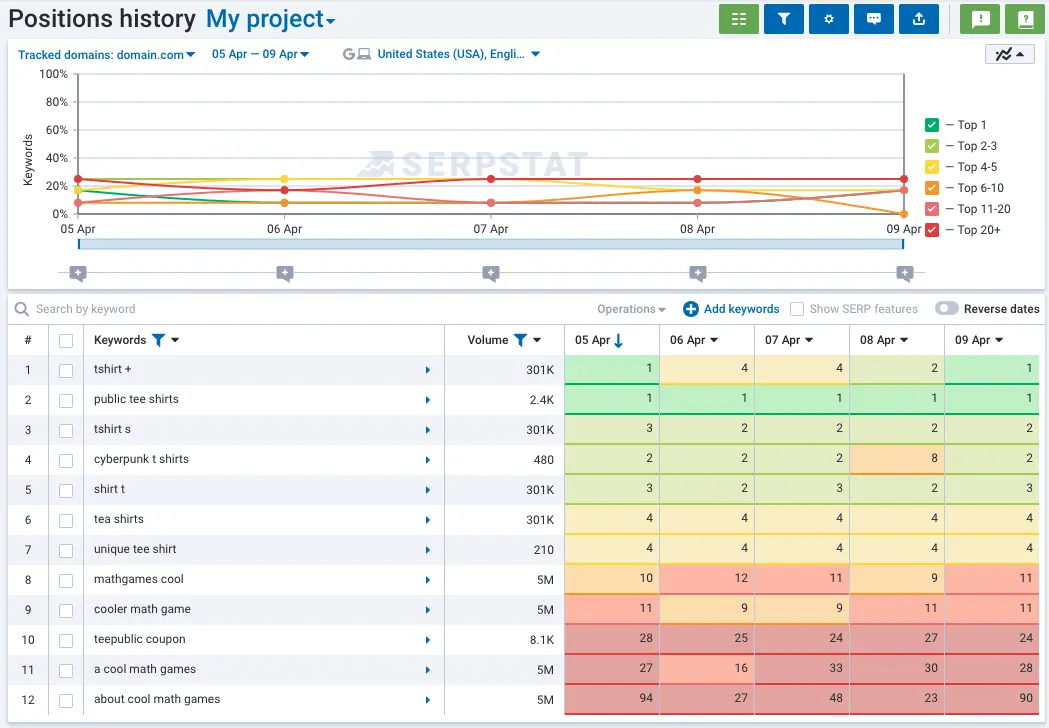
Credit: serpstat.com
Rank Tracking Tools
Rank Tracking Tools are essential for anyone serious about improving their website’s SEO performance. These tools help you monitor your website’s position in search engine results for specific keywords. By using rank tracking tools, you can understand how well your site is performing and what adjustments need to be made.
Monitoring Keyword Rankings
Monitoring keyword rankings is crucial for understanding your SEO progress. It allows you to see which keywords are driving traffic to your site. With this information, you can focus your efforts on optimizing the right keywords. Many rank tracking tools provide daily updates, so you always have the most current data. This helps you stay ahead of your competitors.
Analyzing Ranking Trends
Analyzing ranking trends helps you spot patterns in your SEO performance. These trends can show you if your rankings are improving or declining over time. By understanding these trends, you can make informed decisions about your SEO strategy. Most rank tracking tools offer visual charts and graphs. This makes it easy to see how your keywords are performing.
| Tool | Features |
|---|---|
| SEMrush | Daily updates, competitor analysis, visual reports |
| Ahrefs | Comprehensive keyword tracking, trend analysis, backlink data |
| Moz | Keyword ranking, on-page optimization, site audits |
With the right rank tracking tools, you can improve your SEO strategy. Focus on the keywords that matter most. Track your progress. Adjust your tactics based on data. This way, you can achieve better search engine rankings and drive more traffic to your site.
Competitor Analysis Tools
Competitor analysis tools are essential for any SEO strategy. These tools help you understand your competitors and identify opportunities to improve your website’s ranking. By analyzing your competitors, you can learn from their strengths and weaknesses, and develop a more effective SEO plan.
Evaluating Competitor Strategies
Understanding what your competitors are doing can give you an edge. Use tools to examine their keywords, backlinks, and content strategies.
Here are some key aspects to focus on:
- Keyword Analysis: Discover which keywords your competitors rank for.
- Content Quality: Evaluate the quality and type of content they publish.
- Backlink Profile: Analyze the sources of their backlinks.
- SEO Techniques: Identify the techniques they use for on-page and off-page SEO.
Benchmarking Performance
Benchmarking your performance against your competitors is crucial. This helps you understand where you stand in the market.
Here are some metrics to consider:
- Traffic Volume: Compare the volume of traffic between your site and competitors.
- Engagement Metrics: Look at engagement metrics like bounce rate and average session duration.
- Conversion Rates: Evaluate the conversion rates of your site compared to others.
- Domain Authority: Check the domain authority of your competitors.
Here is a simple table for quick comparison:
| Metric | Your Site | Competitor A | Competitor B |
|---|---|---|---|
| Traffic Volume | 10,000 | 15,000 | 8,000 |
| Average Session Duration | 3 minutes | 4 minutes | 2 minutes |
| Bounce Rate | 50% | 45% | 55% |
| Conversion Rate | 2% | 3% | 1.5% |
| Domain Authority | 40 | 50 | 35 |
Regularly comparing these metrics ensures you stay competitive. Adjust your strategies based on your findings.
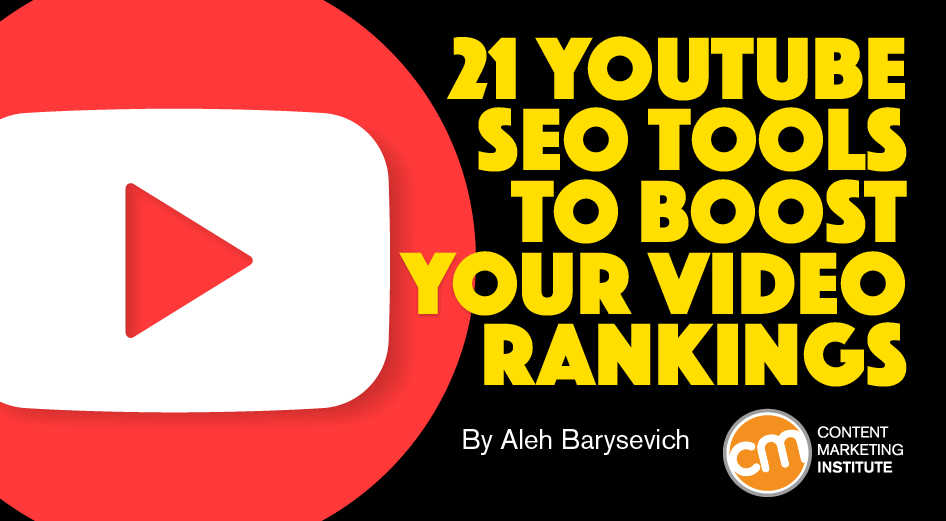
Credit: contentmarketinginstitute.com
Mobile Seo Tools
In today’s digital age, ensuring your website is mobile-friendly is crucial for SEO success. Mobile SEO tools help you optimize your website for smartphones and tablets. This section focuses on tools that enhance mobile SEO performance.
Ensuring Mobile-friendly Design
Having a mobile-friendly design is essential for user experience. Use tools like Google’s Mobile-Friendly Test to check if your site meets mobile standards. This tool analyzes your site and provides insights.
Another great tool is Responsive Design Checker. It allows you to see how your site appears on various devices. This ensures your design works well on all screen sizes.
Improving Mobile Load Time
Fast load times are critical for mobile users. Use Google PageSpeed Insights to measure and improve your site’s speed. This tool offers suggestions to optimize your website’s performance.
Another useful tool is Pingdom. It provides detailed reports on your site’s load time. You can identify and fix issues slowing down your site.
Here is a comparison table of these tools:
| Tool | Features | Benefits |
|---|---|---|
| Google’s Mobile-Friendly Test | Analyzes mobile usability | Identifies issues and provides solutions |
| Responsive Design Checker | Checks design on various devices | Ensures a consistent user experience |
| Google PageSpeed Insights | Measures page load time | Offers optimization suggestions |
| Pingdom | Provides detailed load time reports | Identifies and fixes performance issues |
Using these mobile SEO tools, you can improve your site’s mobile performance. This will enhance user experience and boost your search engine rankings.
Local Seo Tools
Local SEO tools are essential for businesses targeting customers in a specific location. These tools help improve your online presence locally. They can boost your visibility in local searches. This can lead to more foot traffic and local customers.
Optimizing For Local Search
Local search optimization helps your business appear in local searches. This is crucial for attracting local customers. Here are some key steps:
- Keyword Research: Use local keywords relevant to your business.
- Google My Business: Create and optimize your Google My Business profile.
- Local Content: Publish content that is relevant to your local audience.
Using these steps can improve your local search rankings. This increases your chances of being found by nearby customers.
Managing Local Listings
Managing local listings ensures your business information is accurate. This includes your name, address, and phone number. Here are some tips:
- Consistency: Ensure your business information is consistent across all platforms.
- Update Regularly: Regularly update your listings to reflect any changes.
- Monitor Reviews: Respond to customer reviews promptly.
Maintaining accurate local listings helps build trust with potential customers. It also improves your local SEO performance.
| Local SEO Tool | Feature | Benefit |
|---|---|---|
| Google My Business | Manage Business Profile | Increases visibility in Google searches and maps. |
| Moz Local | Listing Management | Ensures consistent business information across platforms. |
| Yext | Review Monitoring | Helps manage and respond to customer reviews. |
Content Optimization Tools
Content Optimization Tools are essential for improving your website’s SEO performance. These tools help in refining your content for better visibility and higher rankings on search engines. They ensure your content is not only relevant but also engaging and easy to read.
Enhancing Readability
Improving readability is crucial for user engagement. Users prefer content that is clear and easy to understand. Tools like Grammarly and Hemingway Editor help in simplifying your text. They identify complex sentences and suggest easier alternatives.
- Grammarly: Checks grammar and punctuation errors.
- Hemingway Editor: Highlights long, complex sentences.
These tools also suggest ways to make your text more concise. Short sentences improve readability and keep the reader’s attention longer.
Boosting Engagement
Engaging content keeps readers on your site longer. Tools like Yoast SEO and BuzzSumo help you create engaging content. Yoast SEO analyzes your content’s SEO-friendliness. It provides suggestions to improve keyword usage and readability.
- Yoast SEO: Ensures keyword optimization and content structure.
- BuzzSumo: Helps identify trending topics and popular content.
Creating content on trending topics attracts more visitors. Using these tools ensures your content is both engaging and optimized for search engines.
| Tool | Primary Function |
|---|---|
| Grammarly | Grammar and punctuation check |
| Hemingway Editor | Simplifies complex sentences |
| Yoast SEO | Keyword optimization and content analysis |
| BuzzSumo | Identifies trending topics |
Using content optimization tools can significantly improve your website’s SEO. They help create content that is easy to read and engaging. This leads to better user experience and higher search engine rankings.
Conclusion And Best Practices
SEO ranking tools are essential for improving your website’s search engine performance. They provide insights into your site’s strengths and weaknesses. These tools help you make informed decisions to boost your rankings. Here, we discuss best practices for using SEO tools effectively.
Choosing The Right Tools
Selecting the right SEO tools is crucial. Not all tools offer the same features. Evaluate your needs first. Identify what aspects of SEO you need help with. Some tools focus on keyword research, while others excel in backlink analysis.
- Functionality: Ensure the tool meets your specific needs.
- Ease of Use: Choose tools with user-friendly interfaces.
- Cost: Balance your budget with the tool’s features.
- Support: Look for tools with good customer support.
Here’s a quick comparison table to help you decide:
| Tool | Functionality | Cost | Support |
|---|---|---|---|
| Tool A | Keyword Research | $$ | 24/7 Support |
| Tool B | Backlink Analysis | $$$ | Email Support |
Implementing Effective Strategies
Once you’ve chosen the right tools, it’s time to implement effective strategies. Keyword research is a fundamental step. Use your tools to identify high-traffic keywords related to your niche. Aim for keywords with lower competition.
On-page optimization is another critical area. Use the tools to analyze your content. Ensure your pages are optimized for your target keywords. This includes meta tags, headings, and content itself.
Backlink building is equally important. Use tools to find backlink opportunities. Focus on getting links from high-authority sites. This can significantly boost your rankings.
Monitor your progress regularly. Tools can track your rankings and traffic. Adjust your strategies based on the data you collect. Always stay updated with the latest SEO trends.
By following these best practices, you can effectively use SEO tools to improve your website’s search engine performance. Remember, the right tools and strategies are key to success.
What Are the Best Tools to Boost Website Visibility and SEO Strategy?
Looking to boost your seo strategy and enhance website visibility? Consider using tools like Google Analytics for insights, Moz for keyword research, SEMRush for competitor analysis, and Ahrefs for backlink monitoring. These tools can help you optimize your website and improve your search engine ranking.
Can SEO Ranking Tools Help Improve Organic Reach for Content Visibility?
Using SEO ranking tools can certainly boost your visibility on search engines. By analyzing keywords, backlinks, and content performance, these tools can help improve organic reach for your content. With the right strategy and optimization, your content can be more visible to your target audience.
Frequently Asked Questions
What Are Seo Ranking Tools?
SEO ranking tools help analyze website performance on search engines. They provide insights for improvement.
How Do Seo Tools Boost Rankings?
SEO tools optimize content, keywords, and technical aspects. This results in higher search engine rankings.
Which Is The Best Seo Tool?
The best SEO tool depends on your needs. Popular options include Ahrefs, SEMrush, and Moz.
Are Free Seo Tools Effective?
Free SEO tools can be effective for basic analysis. For advanced features, consider paid options.
How Can Seo Ranking Tools Help Improve Organic Reach and Content Visibility?
Are you looking to boost your content visibility today with organic reach? SEO ranking tools can help you achieve this goal by analyzing your website’s performance, identifying improved keywords, and monitoring your competitors’ strategies. By leveraging these tools, you can optimize your content to enhance organic reach and increase visibility. These SEO ranking tools can also provide insights into user behavior and preferences, allowing you to tailor your content to better resonate with your target audience. By incorporating these insights into your organic reach strategies, you can attract more qualified traffic to your site and ultimately improve your conversion rates. Additionally, regularly monitoring and adjusting your organic reach strategies based on the data provided by these tools can help ensure that your content remains relevant and competitive in your industry.
Conclusion
Choosing the right SEO ranking tools is crucial for your website’s success. These tools help you track and improve your site’s performance. They offer insights that guide your strategy. Investing in the best tools can save time and boost your rankings.
So, take action today. Find the tools that fit your needs. Watch your website climb the search results and attract more visitors. Happy optimizing!

